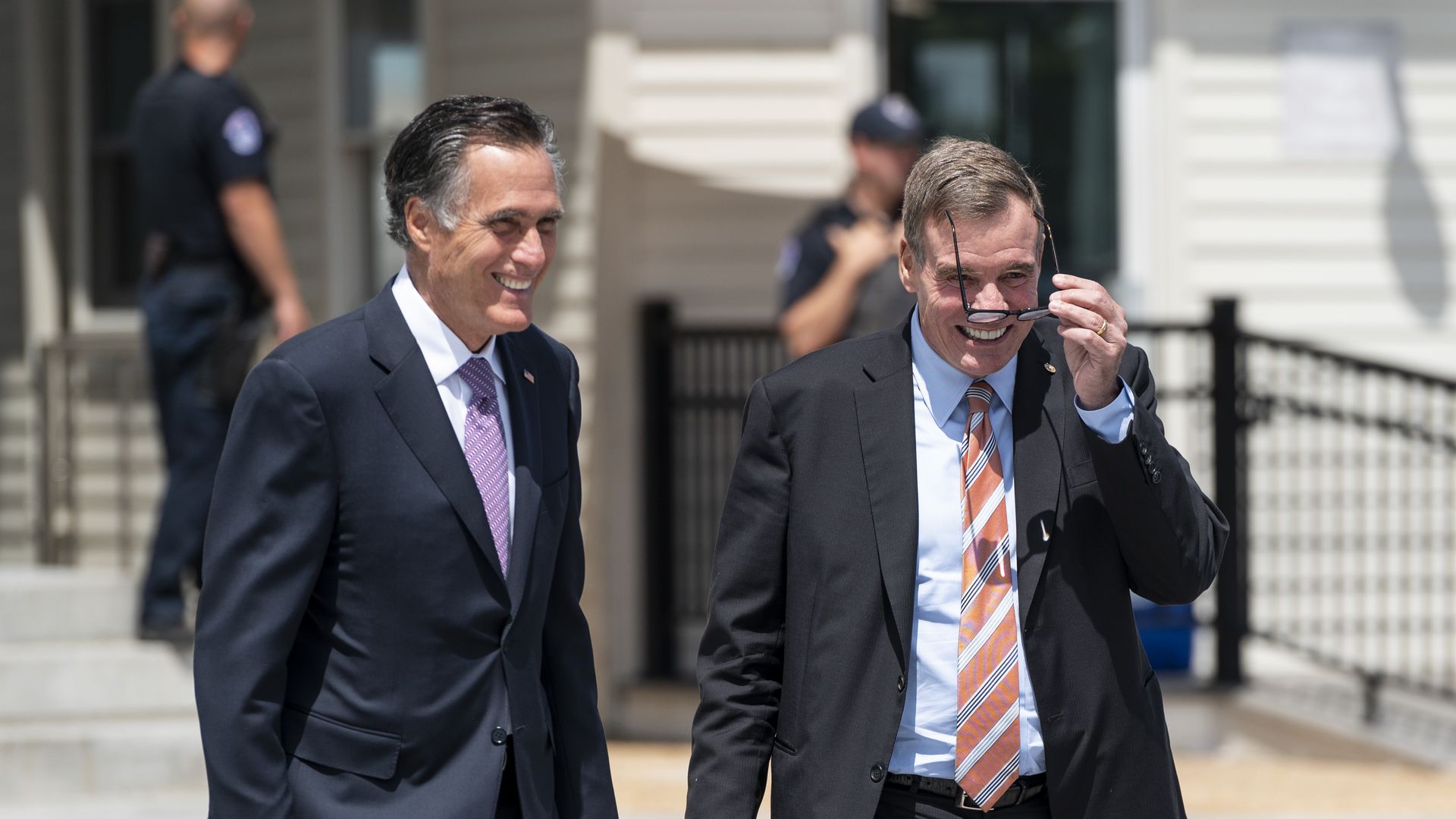Bipartisan group reaches agreement on $1.2 trillion "hard" infrastructure bill
Add Axios as your preferred source to
see more of our stories on Google.

Sens. Mitt Romney (R-Utah) and Mark Warner (D-Va.) Photo: Bill Clark/CQ-Roll Call, Inc via Getty Images.
After weeks of long nights and endless Zoom calls, a bipartisan group of senators finally reached a deal on "the major issues" in their $1.2 trillion "hard" infrastructure package, GOP senators involved in the talks announced Wednesday.
Why it matters: It could be days before the group finishes writing the bill, but the Senate can begin debating the legislation in earnest now that they have resolved the outstanding issues. The bill needs 60 votes to advance in the Senate.
- Senate Majority Leader Chuck Schumer (D-N.Y.) said that the Senate could vote as early as Wednesday night to advance the proposal, the second time they will vote on this procedural measure.
- Schumer also insists he's prepared to keep the Senate in session over the weekend to finish the bipartisan infrastructure bill: "It’s time for everyone to get to yes,” he announced on the floor on Monday.
- Senate Democrats plan to hold a special caucus meeting at 1pm to learn more about the bill, two sources familiar with the meeting tell Axios.
By the numbers: The deal is expected to cost $1.2 trillion over eight years, and offers more than $550 billion in new spending, including ...
- $110 billion in new funds for roads, bridges, and major projects, $40 billion of which is new funding for bridge repair, replacement, and rehabilitation and $17.5 billion for major projects.
- $73 billion for the country's electric grid and power structures.
- $66 billion for rail services.
- $65 billion for broadband.
- $55 billion for clean drinking water.
- $21 billion in environmental remediation.
- $50 billion for flooding and coastal resiliency.
- $39 billion in new transit funding to modernize transit. This is the largest federal investment in public transit in history, according to the White House.
- $25 billion for airports.
- $17 billion in port infrastructure.
- $11 billion in transportation safety programs.
- $7.5 billion for electric vehicles and EV charging; $2.5 billion in zero emission buses, $2.5 billion in low emission buses, and $2.5 billion for ferries.
- $1 billion for planning, design, demolition, and reconstruction of street grids, and parks.
- The bill will include language regarding enforcement of unemployment insurance fraud, and is fully paid for.
Pay-fors: According to the White House, the bill will be offset through redirecting unspent emergency relief funds, targeted corporate user fees, and strengthening tax enforcement when it comes to cryptocurrencies, in addition to other bipartisan measures.
What they're saying: “We now have an agreement on the major issues," Sen. Rob Portman (R-Ohio), the lead GOP negotiator, announced Wednesday afternoon.
- "We are still finalizing the details, but we have reached agreement on the major issues," Collins said. "I am delighted that we've been able to come together as a bipartisan group."
- "There is a CBO official score that covers much of the bill," Portman said, something many GOP senators deem necessary before voting on the measure.
Behind the scenes: The deal comes hours after Portman and White House counselor Steve Ricchetti huddled for hours at the Capitol Tuesday night hashing out the remaining sticking points of the bill.
- The biggest problems revolved around transit policy and how to pay for the package, among other hurdles.
- On Wednesday morning, Sens. Portman, Collins, Cassidy, Mitt Romney (R-Utah), Lisa Murkowski (R-Alaska) met with Senate Minority Leader Mitch McConnell (R-Ky.) in his office.
- McConnell so far has taken a hands-off approach to the talks. This meeting signals the group is ready to bring him into the fold.
What's next: Schumer has made clear that both the bipartisan bill and the Senate's $3.5 trillion budget resolution need to pass prior to August recess, which as of now is still scheduled to begin in less than two weeks.
